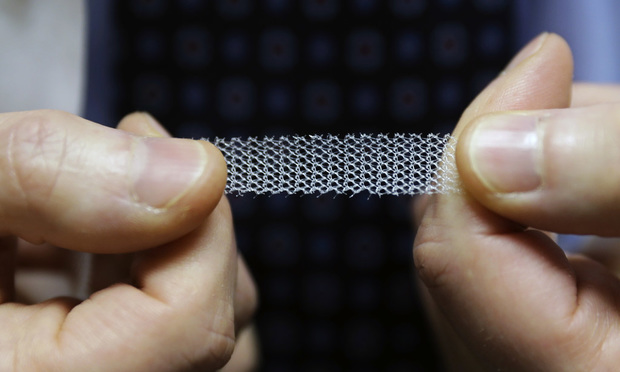More Pelvic Mesh Cases Are Heading to Pa. Federal Court in Wake of Series of Big Verdicts
Late last month, the judge overseeing the multidistrict litigation in West Virginia federal court transferred dozens of cases back to their home districts across the country, with the largest batch of lawsuits—nearly 20—ending up in Pennsylvania federal court.
May 21, 2019 at 04:02 PM
5 minute read
 Dr. Jeffrey Clemons, a pelvic reconstructive surgeon, holds a sample of transvaginal mesh used to treat pelvic floor disorders and incontinence in women as he poses for a photo Dec. 20, 2018, in Tacoma, Washington. AP photo: Ted S. Warren
Dr. Jeffrey Clemons, a pelvic reconstructive surgeon, holds a sample of transvaginal mesh used to treat pelvic floor disorders and incontinence in women as he poses for a photo Dec. 20, 2018, in Tacoma, Washington. AP photo: Ted S. Warren
Philadelphia juries have hammered Johnson & Johnson subsidiary Ethicon with more than $345 million in verdicts over its pelvic mesh products, and now another wave of litigation is coming to Pennsylvania.
Late last month, the judge overseeing the multidistrict litigation in West Virginia federal court transferred dozens of cases back to their home districts across the country, with the largest batch of lawsuits—nearly 20—ending up in Pennsylvania federal court. Since the April 26 transfer, defendants have sought to toss some cases, and in others judges have begun entering scheduling orders, complete with 2020 trial dates.
Kline & Specter attorney Shanin Specter, a leading attorney in the pelvic mesh litigation whose firm tried each successful case in Philadelphia, said he expects the federal cluster of cases will move quickly to trial.
“The judges right now are scheduling conferences in the cases,” he said. “We expect, particularly given how quickly judges in this district move their dockets, that there will be some additional discovery done in a brief time, and there will be prompt trial listings.”
Mindy Tinsley, a spokeswoman for Ethicon, said in an emailed statement, “We look forward to defending these cases in federal court.”
U.S. District Judge Joseph Goodwin of the Southern District of West Virginia transferred a wave of nearly 50 cases out of the MDL last month. Of those cases, 18 cases were sent to Pennsylvania federal courts, with 16 going to the U.S. District Court for the Eastern District of Pennsylvania and two going to the Western District.
The pelvic mesh MDL, which once included more than 100,000 cases pending against six defendants, stood at about 15,000 cases as of mid-May. According to Goodwin's order, plaintiffs in the majority of remaining cases have settled, but “thousands remain languishing” in the court.
“For convenience of the parties and in order to promote the final resolution of these cases, it appears to the court that the cases would be more expeditiously concluded in the jurisdiction from which they originally came to this court,” Goodwin said.
Along with sending nearly 20 cases to Pennsylvania in his first wave of transfers, Goodwin also sent cases to Connecticut, New York, Texas, California, Georgia and other states.
Although federal juries have awarded juries significant verdicts over the allegedly dangerous products, the largest verdict in the litigation so far was handed up by a Philadelphia state court jury late last month. The case, McFarland v. Ethicon, ended with a $120 million verdict, including $100 million in punitive damages. The judge who oversaw the trial denied Ethicon's post-trial motions Monday.
The McFarland verdict was followed up less than a month later with an $80 million verdict for a Pennsylvania woman. McFarland was also preceded by a $41 million verdict in January. All three cases were tried before a Philadelphia state court jury.
Ethicon has won two defense verdicts in the litigation, with the latest coming in mid-April. The first defense win, however, was later reversed by the trial court, after the judge who oversaw the case determined that the jury's findings were inconsistent on the issue of whether the alleged design defect caused the injuries. The judge ultimately determined that the case should proceed to a damages hearing, but that decision is currently on appeal to the Pennsylvania Superior Court.
A significant difference between state and federal trials is the jury pool. While the Philadelphia Court of Common Pleas pulls jurors from around the city, the Eastern District jury pool includes jurors from as far west as Lancaster County and as far north as Northampton County.
Specter said he did not expect the trials in federal courts to be substantially different than those that have taken place in state court because Philadelphia's trial judges largely modeled their rulings off of Goodwin's decisions.
“We've now had nine trials, our firm. Eight victories, seven of those involved the imposition of punitive damages. Even the ninth case, the jury found negligence,” Specter said. “There's an overwhelming message that's being transmitted by eight separate juries, really nine separate juries, that the company has acted very badly, and it's disturbing that the mesh products for stress urinary incontinence are still on the market.”
However, before any of the federal trials get underway, one pelvic mesh case is scheduled to come before another Philadelphia jury in early June, and another wave of state court cases are set to be tried in state court in the fall.
This content has been archived. It is available through our partners, LexisNexis® and Bloomberg Law.
To view this content, please continue to their sites.
Not a Lexis Subscriber?
Subscribe Now
Not a Bloomberg Law Subscriber?
Subscribe Now
NOT FOR REPRINT
© 2025 ALM Global, LLC, All Rights Reserved. Request academic re-use from www.copyright.com. All other uses, submit a request to [email protected]. For more information visit Asset & Logo Licensing.
You Might Like
View All
Superior Court Directs Western Pa. Judge to Recuse From Case Over Business Ties to Defendant
3 minute read

Kline & Specter and Bosworth Resolve Post-Settlement Fighting Ahead of Courtroom Showdown
6 minute read
Saxton & Stump Lands Newly Retired Ex-Chief Judge From Middle District of Pa.
3 minute readTrending Stories
Who Got The Work
J. Brugh Lower of Gibbons has entered an appearance for industrial equipment supplier Devco Corporation in a pending trademark infringement lawsuit. The suit, accusing the defendant of selling knock-off Graco products, was filed Dec. 18 in New Jersey District Court by Rivkin Radler on behalf of Graco Inc. and Graco Minnesota. The case, assigned to U.S. District Judge Zahid N. Quraishi, is 3:24-cv-11294, Graco Inc. et al v. Devco Corporation.
Who Got The Work
Rebecca Maller-Stein and Kent A. Yalowitz of Arnold & Porter Kaye Scholer have entered their appearances for Hanaco Venture Capital and its executives, Lior Prosor and David Frankel, in a pending securities lawsuit. The action, filed on Dec. 24 in New York Southern District Court by Zell, Aron & Co. on behalf of Goldeneye Advisors, accuses the defendants of negligently and fraudulently managing the plaintiff's $1 million investment. The case, assigned to U.S. District Judge Vernon S. Broderick, is 1:24-cv-09918, Goldeneye Advisors, LLC v. Hanaco Venture Capital, Ltd. et al.
Who Got The Work
Attorneys from A&O Shearman has stepped in as defense counsel for Toronto-Dominion Bank and other defendants in a pending securities class action. The suit, filed Dec. 11 in New York Southern District Court by Bleichmar Fonti & Auld, accuses the defendants of concealing the bank's 'pervasive' deficiencies in regards to its compliance with the Bank Secrecy Act and the quality of its anti-money laundering controls. The case, assigned to U.S. District Judge Arun Subramanian, is 1:24-cv-09445, Gonzalez v. The Toronto-Dominion Bank et al.
Who Got The Work
Crown Castle International, a Pennsylvania company providing shared communications infrastructure, has turned to Luke D. Wolf of Gordon Rees Scully Mansukhani to fend off a pending breach-of-contract lawsuit. The court action, filed Nov. 25 in Michigan Eastern District Court by Hooper Hathaway PC on behalf of The Town Residences LLC, accuses Crown Castle of failing to transfer approximately $30,000 in utility payments from T-Mobile in breach of a roof-top lease and assignment agreement. The case, assigned to U.S. District Judge Susan K. Declercq, is 2:24-cv-13131, The Town Residences LLC v. T-Mobile US, Inc. et al.
Who Got The Work
Wilfred P. Coronato and Daniel M. Schwartz of McCarter & English have stepped in as defense counsel to Electrolux Home Products Inc. in a pending product liability lawsuit. The court action, filed Nov. 26 in New York Eastern District Court by Poulos Lopiccolo PC and Nagel Rice LLP on behalf of David Stern, alleges that the defendant's refrigerators’ drawers and shelving repeatedly break and fall apart within months after purchase. The case, assigned to U.S. District Judge Joan M. Azrack, is 2:24-cv-08204, Stern v. Electrolux Home Products, Inc.
Featured Firms
Law Offices of Gary Martin Hays & Associates, P.C.
(470) 294-1674
Law Offices of Mark E. Salomone
(857) 444-6468
Smith & Hassler
(713) 739-1250





